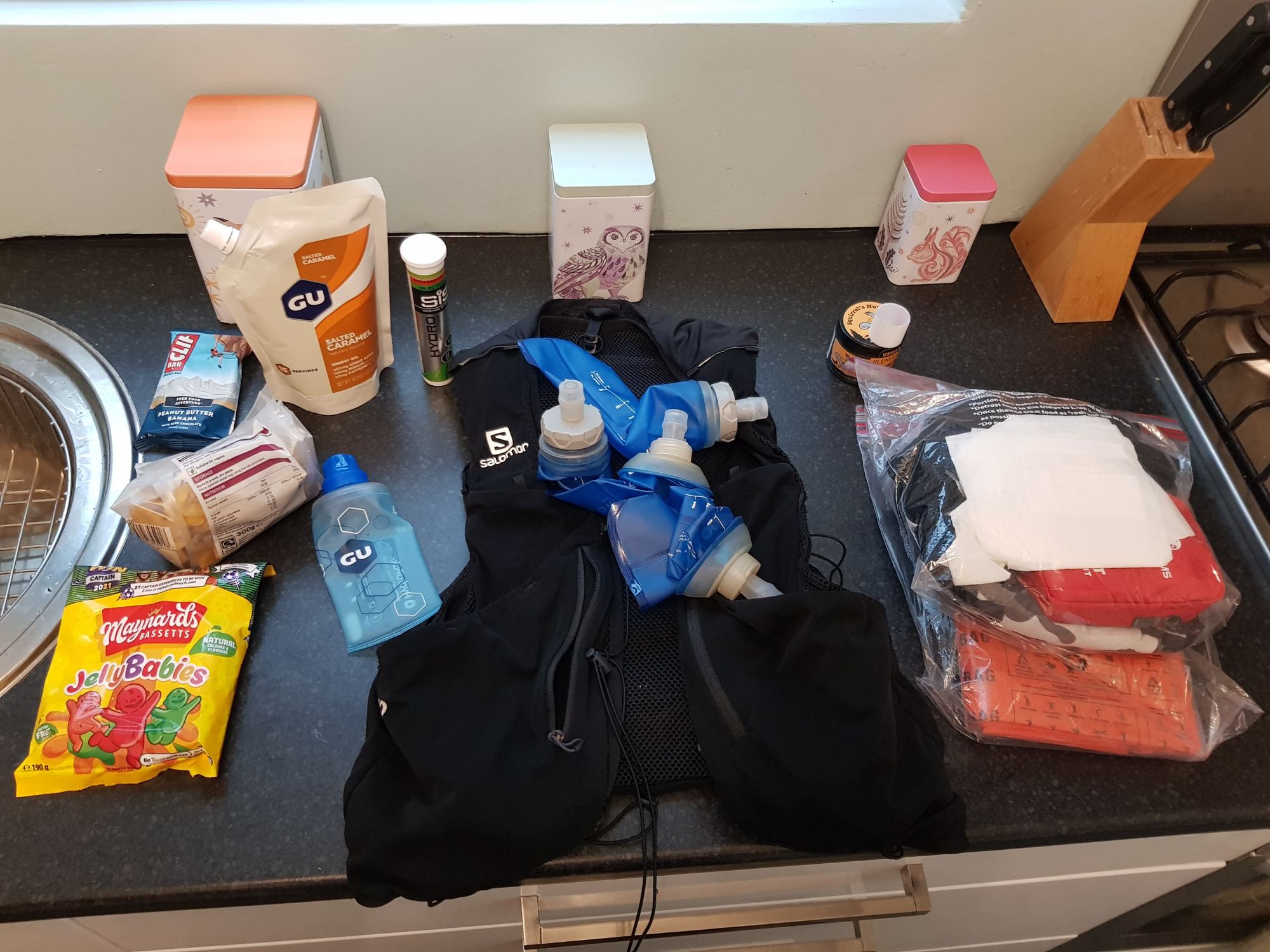Marathon Rituals & Kit List 2021
What gear, nutrition & hydration I carry for a marathon. Written for those planning their first 26.2 miles

Following plenty of hard lessons over the last year and a total of 8 marathons, I've pinned down a fairly stable kit list I use for all marathons, whether it be road or trail, and one I'll be using as the template for the Green Man Ultra.
I write this in the hope that it will help those who are looking at doing their first marathons and unsure what they should be carrying.
A note on this list: it is intended for a solo self supported marathon; due to the Covid lockdown I'm still yet to do a in-person marathon event so am very use to carrying my own nutrition and hydration.
If you are doing an event they almost certainly have water and food at checkpoints for you, bear in mind however it's always handy to be in control of your nutrition on the day; there is nothing worse than trying something new on race day and having it repeat on you an hour later.
As an extension to that, it is essential you practise with your gear, nutrition and hydration plans before the event on your long training runs. It gets you use to what you'll be carrying, ensures your body is happy with whatever gels / chews / jelly babies you're using and that you've taken enough water for your needs.
Pre Race Ritual
I tend to pack this bag and lay out the clothes the night before so I'm not stressing about anything come the morning.
On the morning I'll apply two things before my running clothes:
Firstly is Squirrel's Nut Butter, an anti-chafe cream that helps ensure anywhere you may get rubbing is protected. For me this is my ... sensitives, between and around my upper legs where I tend to chafe. It's worth noting you may not chafe at all on shorter distances, but almost certainly will on a marathon so better to play it safe than sorry.

Secondly is Microporous Tape, which goes squarely across both nipples and pressed so it won't come off. Microporous tape nicely survives sweat and rain and I'm yet to see it come off in a run. The downside is it can be painful to remove afterwards, soaking in water and soap helps!
This is common for long distance runners as, even in a nice polyester top, the chafing will eventually become too much, and no-one wants nips bleeding through their shirt. It also hurts like hell and can ruin your run.

Clothing
For summer marathons it's a nice basic set of kit:
- Thin, lightweight shorts
- Polyester top / vest
- Baseball cap
- Buff in pocket
The "polyester" bit of the top is critical, really helps prevent chafing and dries quickly. Nylon, bamboo, latex & wool are also meant to be great alternatives. Cotton is a nightmare to run in.
A baseball cap both helps keep the sun off your scalp and, if it rains, stops rain getting in your eyes so you can see clearly. Running Punks do a tasty one here.
The buff is there as it's always useful to have the rag of cloth, whether it's for your nose, wiping sweat away or using as a back up hat.
If it's looking like heavy rain I'll take a coat rolled up and stuffed into the back section of the backpack.
If you want some ideas for colder weather gear here's a write up of what I used last winter.
Back Pack
Still going strong with the Salomon Adv Skin 12 running pack; plenty of storage for a Marathon. The variety of pockets ensure I can keep all the nutrition to hand, the front bottle holders are convenient for refuelling and it has space for a hydration pack if that's your sort of thing.

Hydration
1x 500ml bottle of water per hour of the run, I normally take 4 bottles for a marathon and ration them out over the 4-5 hours it usually takes me. If it's especially hot I'll add another bottle.
Two of these bottles are in the front pockets of the running vest, 2 are at the back and switched out at the half way point.
At marathon distance it is critical you think about electrolyte replenishment Hyponatremia; a condition caused by having low sodium levels in your blood, is a real risk when you're running for that long.
As you run you sweat out sodium and potassium (your "electrolytes"). Usually you get these back from the foods you eat, however when running marathon plus distances you can be sweating them out faster than you are taking them back in. As you drink more water, you actually dilute the sodium levels further, which can lead to Hyponatremia.
It can happen to anyone, Damian Hall, who recently broke the Pennine Way record, suffered from it at the end of the race and blogged about it here.
To that end, I use 1 SIS Hydro tablet per every 2 drinks to replenish my salts, 1 per drink if it's especially hot out. These tablets dissolve in your water bottle, and you can pick them up in most supermarkets now.

You can buy salt tablets instead if you prefer to stick to plain water.
Nutrition
The most subjective advice on this list, here's what I've found has worked for me.
I take on ~20g carbohydrates every 30 mins, then eat some more substantial "real" food at the 2 hour mark.
For the 30 min intervals I try and bring a variety of things. Each of these are things that are relatively easy to carry and chew on the move:
- Soreen Malt Loaf - 1/5 a loaf == 20g carbs
- Jelly Babies - 4 babies == 20g carbs
- Dried Banana Chips - small handful == 20g carbs
- Gu Salted Caramel Gel - 1 gel == 20g carbs

Carrying this can be a challenge, for the loose stuff and loaf I've brought small silicon pouches from Stasher (pocket & snack sizes) to avoid having to keep using plastic food bags. For the gels Gu Energy do a flask for storing the gel that saves on throwing away lots of gel packets, it stores 5 servings of gel.
For the 2 hour "real" food mark I tend to eat a Clif Bar for a little extra protein.

Backup & Safety
In the back of the pack I always, always have a dry bag with the following contents:
- First aid kit - In case of any injuries incurred
- Spare gloves & buff - If the temperature drops or rain gets especially heavy
- Sun cream - Always good if there's more sun on the day that expected
- Kitchen roll tissues - Emergency loo breaks...
- Spare anti-chafe cream - If anything unexpected starts rubbing
If running somewhere even slightly remote, I'll also take an emergency blanket in the back. This is useful if you have a fall / break something and need to wait for rescue. Doesn't weigh much and could save your life.
Post Run Recovery Ritual
Once the marathon is done, within the first 30 mins I'll drink a recovery drink; either a For Goodness Shakes Recovery Drink or Tailwind Recovery Powder mixed with water. The boost of protein can help with recovery.

If it was hot out I may also take another 500ml water with an electrolyte tablet.
Tend to have a bath to help relax afterwards.
Then it's a day of eating, lots of good recovery foods like Nakd and Veloforte bars, and we always have a big old pizza takeaway post marathon.
